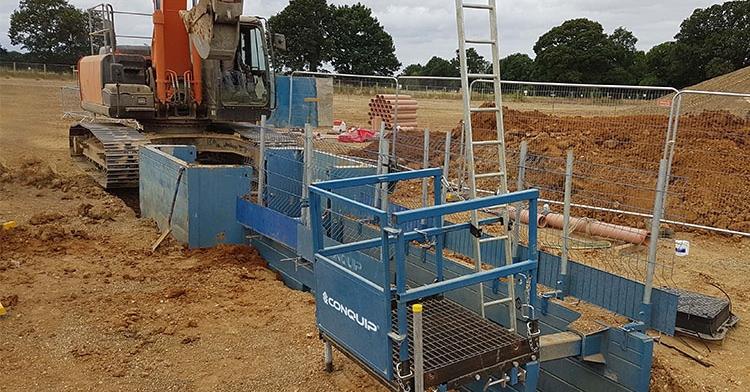In the world of construction, safety and efficiency are paramount. The utilization of trench boxes, also known as trench shields or trench shoring systems, has revolutionized the construction industry by providing an array of benefits that significantly improve project outcomes. From ensuring worker safety to increasing productivity, trench boxes offer a comprehensive solution for managing trenches effectively.
In this informative guide, we will tell the diverse advantages of using trench box, shedding light on their role in modern construction practices.
Introduction: Enhancing Construction Safety and Efficiency with Trench Boxes
Trenches are an integral part of various construction projects, from installing pipelines to constructing foundations. However, working in trenches can be hazardous due to potential collapses, soil movements, and other unforeseen dangers. Trench boxes act as protective shields that safeguard workers and equipment, making trench-related tasks safer and more manageable. By understanding the benefits of using trench boxes, construction professionals can make informed decisions that enhance both safety and productivity on the job site.
Benefits of Using Trench Box
Minimizing Safety Risks
Construction trenches are prone to collapsing, posing life-threatening risks to workers. Trench boxes provide a secure enclosure that prevents soil movement and cave-ins. The robust construction of trench boxes ensures stability, effectively reducing the chances of accidents. Their presence creates a protective barrier, offering workers a safer environment to carry out their tasks.
Enhancing Efficiency
Trench boxes streamline construction activities by minimizing downtime caused by accidents and safety concerns. When workers feel secure, they can focus on their tasks with greater concentration and effectiveness. This heightened efficiency translates into quicker project completion, saving time and resources.
Preventing Soil Erosion
Trenches without proper support can lead to soil erosion, especially in areas with unfavorable weather conditions. Trench boxes provide structural integrity to trenches, preventing soil from collapsing into the trench and minimizing erosion. This not only maintains the integrity of the construction site but also reduces the environmental impact.
Supporting Heavy Equipment
Construction projects often require the use of heavy machinery and equipment. Trench boxes create a stable foundation for such equipment, ensuring they remain steady and secure while performing tasks within the trench. This stability not only prevents accidents but also enhances the accuracy of construction activities.
Complying with Regulations
Workplace safety regulations are stringent, and non-compliance can result in hefty penalties. Using trench boxes demonstrates a commitment to worker safety and regulatory compliance. By providing a safe working environment, construction companies can avoid legal complications and build a reputation for responsible practices.
Cost-Effectiveness
Investing in trench boxes may seem like an additional cost, but it is a prudent long-term investment. The benefits of preventing accidents, minimizing downtime, and complying with regulations far outweigh the initial expenditure. Ultimately, trench boxes contribute to cost savings and a healthier bottom line.
Versatility
Trench boxes are adaptable tools suitable for a wide range of construction projects. Whether the task involves plumbing, electrical work, or installing utilities, trench boxes can be customized to fit various trench sizes and shapes. This versatility makes them a valuable asset in the construction industry.
Promoting Worker Confidence
When workers feel protected and valued, their confidence soars. Trench boxes instill a sense of security, boosting worker morale and overall job satisfaction. This positive atmosphere contributes to a harmonious and productive work environment.
Reducing Project Delays
Delays in construction projects can have cascading effects on timelines and budgets. Trench boxes play a pivotal role in preventing delays caused by accidents, soil instability, and weather-related issues. By maintaining a stable work environment, these tools contribute to the timely completion of projects.
Improving Public Perception
Construction sites are often visible to the public, and their appearance and safety practices reflect on the construction company’s image. Trench boxes contribute to a tidier, more organized work site, enhancing the company’s reputation among stakeholders and the general public.
FAQs
Q: How do trench boxes enhance safety on construction sites?
A: Trench boxes create a protective enclosure that prevents soil collapse and cave-ins, minimizing the risks associated with working in trenches.
Q: Are trench boxes suitable for all types of construction projects?
A: Yes, trench boxes are versatile tools that can be customized to fit various trench sizes and shapes, making them suitable for a wide range of construction tasks.
Q: Do trench boxes comply with safety regulations?
A: Absolutely, using trench boxes demonstrates compliance with workplace safety regulations, helping construction companies avoid legal complications.
Q: Are trench boxes a cost-effective investment?
A: Yes, despite the initial expenditure, trench boxes contribute to cost savings by preventing accidents, minimizing downtime, and promoting worker efficiency.
Q: How do trench boxes prevent soil erosion?
A: Trench boxes provide structural support to trenches, preventing soil from collapsing and minimizing erosion, especially in adverse weather conditions.
Q: Do trench boxes contribute to project timelines?
A: Yes, trench boxes play a significant role in preventing project delays caused by accidents, soil instability, and adverse weather conditions.
Q: How do trench boxes contribute to environmental sustainability?
A: Trench boxes help prevent soil erosion and maintain the integrity of the construction site, reducing the negative environmental impact caused by soil displacement and erosion.
Q: Can trench boxes be used in confined spaces?
A: Yes, trench boxes can be designed to fit into confined spaces, ensuring worker safety even in challenging and tight environments.
Q: What materials are trench boxes typically made from?
A: Trench boxes are commonly constructed from materials like steel or aluminum, which offer durability and stability to withstand the pressures of the surrounding soil.
Q: Do trench boxes require specialized training for installation?
A: While trench boxes are relatively easy to install, it’s recommended that workers receive proper training to ensure correct assembly and usage, maximizing their safety benefits.
Q: How do trench boxes mitigate the risks of trench cave-ins?
A: Trench boxes create a protective shield around workers, preventing soil movement and cave-ins, ensuring that workers can operate within the trench safely.
Q: Are there different types of trench boxes available?
A: Yes, there are various types of trench boxes, including slide rail systems and hydraulic shores, each designed to address specific construction requirements and trench depths.
Q: Can trench boxes be used for underwater construction projects?
A: Trench boxes can be adapted for underwater construction projects, providing a secure environment for workers and equipment even in challenging aquatic conditions.
Q: Are trench boxes suitable for temporary and long-term projects?
A: Trench boxes are versatile tools that can be used for both short-term and long-term construction projects, providing safety benefits across various project durations.
Conclusion
The benefits of using trench boxes in construction are both compelling and far-reaching. From safeguarding worker safety to improving efficiency, these innovative tools have become indispensable assets on construction sites worldwide. By investing in trench boxes, construction companies prioritize both their workers’ well-being and the success of their projects. As the construction industry continues to evolve, trench boxes stand as a testament to human ingenuity and the ongoing pursuit of safer, more efficient construction practices.


